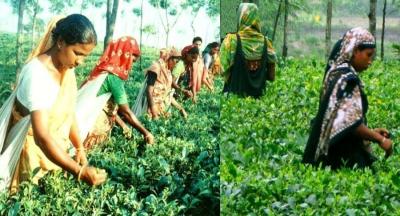RANGPUR, May 21, 2018 (BSS) – Some 9,000 unemployed rural women have changed their fate by plucking green tea- leaves in tea gardens of Panchagarh and Thakurgaon districts in last nine years.
The women have won poverty leading better life now with a dream of building better future for their children.
“The tea sector has ushered a new era in women empowerment helping the women to contribute to their families for living with dignity and educating children,” said Vice-president of Panchagarh Chamber Mehedi Hasan Khan Babla today.
He said the expanding tea sector has created huge jobs in the tea gardens of the two sub-Himalayan districts for over 9,000 poor, unemployed and distressed women to change their fortune.
“The female tea-garden workers, including unemployed young girls, housewives, widows and divorcees are happy as the prospective tea sector is growing fast there, creating more jobs to ensure their livelihoods,” Babla added.
Talking to BSS, female labourers Julekha, Lucky Begum and Motahera Khatun of Tentulia upazila in Panchagarh said they are earning daily wages of Taka 200 to 280 on an average as plucking workers.
They also said they are now taking meals thrice on a day, using sanitary latrines, taking health care, adopting family planning methods and living peacefully.
Similarly, female labourers Konika, Afroza and Azmeri of Panchagarh Sadar upazila said they are earning better wages by plucking tea-laves to live better with ensuring livelihoods though they had hard days with no jobs even a decade ago.
The female tea-garden workers expressed their common happiness of sending their children to schools as plucking of tea-leaves has created jobs to improve their economic conditions.
Officials of Bangladesh Tea Board (BTB) at Panchagarh regional office said the tea sector is growing fast with increases production every year changing economy of the two districts and improving economic condition of the farmers and common people.
“Tea is being cultivated now on 2,265 hectares of land against 1,845 hectares of land last year in these two northern districts,” said Dr Mohammad Shameem Al Mamun, Senior Scientific Officer of BTB at Panchagarh.
Tea is being cultivated in nine tea estates and 18 gardens and vast lands of small-scale farmers in these two districts where production of ‘made-tea’ increased by 70 percent last year alone than the previous year.
“An all-time record quantity of 54.40-lakh kg ‘made-tea’, worth Taka 108.80 crore, was manufactured in 2017, higher by 70 percent than 32-lakh kg ‘made- tea’ manufactured in 2016,” Dr Mamun said.
“The ‘made-tea’ output will further increase with creating more jobs as the farmers have cultivated the crop on 420 hectares of more land this year than last year in these two districts,” Dr Mamun said.



